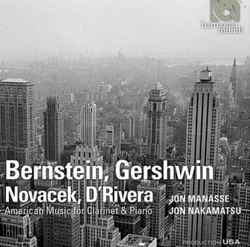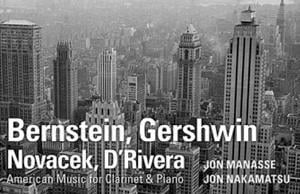
What better way to usher in a new year than to have fun with that funmost of instruments, the clarinet?
Those who love William Bolcom’s Graceful Ghost reinvention of ragtime will take instantly to the first four cuts of this new Harmonia Mundi release, American Music for Clarinet and Piano. John Novacek’s Four Rags for Two Jons is irresistibly performed by the dedicatees, Jon Manasse (clarinet) and Jon Nakamatsu (piano) — all the way from the lively opener, Schenectady, to the Keystone Kops-ish finale, Full Stride Ahead replete with a shouted “Hot dog!” from the Jons. Along the way is my favorite of the four: the simultaneously supple and slouchy 4th Street Drag. It alone is worth the price of the disk.
Novacek is a pianist himself, and has played some 30 concertos with dozens of orchestras. Known for his easygoing and collaborative nature, he has been featured on Prairie Home Companion and The Tonight Show. It’s no wonder that his music slides so agreeably into the consciousness.
Listen To The Music
Four Rags for Two Jons: II. 4th Street DragThe Cape Cod Files: Bandoneón
Related Article
Pianist Jon Nakamatsu: Teaching Them Well
April 12, 2010
The next four cuts are the Cape Cod Files by the Cuban-born Paquito D’Rivera, written for the Jons’ Cape Cod Chamber Music Festival. The first three movements of this clarinet sonata (though to me it sounds more like a loosely organized suite) take off in styles related to Benny Goodman (Benny @ 100), Astor Piazzolla (Bandoneón), and the Cuban composer of Malagueña, Ernesto Lecuona (Lecuonerías), respectively. The finale, Chiquita Blues, is a not-so-bluesy homage to a Cuban vaudeville dancer. The first movement has some interest, as it progresses into an odd boogie-woogie, yet the most successful of the four movements is Bandoneón, the one that sounds most like its imitated composer, Piazzolla, and that was named after his instrument, the concertina.
Leonard Bernstein’s two-movement Clarinet Sonata follows. Written early in the composer’s career (1942), the work betrays the harmonic influence of another composer who at the time was considered one of the greatest modernists but who has fallen out of fashion today to an almost grotesque extent, Paul Hindemith. Bernstein’s lyric gifts and penchant for polymeters rise above the German’s influence, however.
The CD concludes with arrangements of music by George Gerswhin: the Three Preludes, originally for piano, and a two-minute take on I Got Rhythm.
Throughout, Manasse and Nakamatsu sound warmly engaging in their approach. Especially effective are their use of rubato (albeit with a couple of resulting lapses in synchronicity) and the smoothness of their attack.
This CD is highly recommended, despite the somewhat short running time of 56 minutes.

